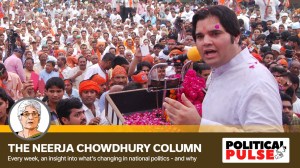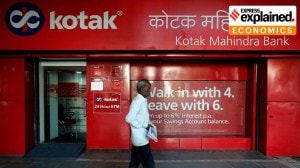- India
- International
Under blue Silicon Valley skies, Indian-Americans find no algorithm can help choose between Biden and Trump
The choice swings from between a Trump that impacts immigrants and taxes to a more liberal but regulatory Biden.
 A statue of Mahatma Gandhi at the Ferry Building in San Francisco. (Express photo by Nandagopal Rajan)
A statue of Mahatma Gandhi at the Ferry Building in San Francisco. (Express photo by Nandagopal Rajan)In September 2014, when some 50,000 people gathered at Madison Square Garden in New York City to hear Indian Prime Minister Narendra Modi speak, it was perhaps one of the most visible indications of the political participation of Indian-Americans in the United States. For a group that constitutes just about 1% of the US population, the event was about emphasising that their vote in the US mattered.
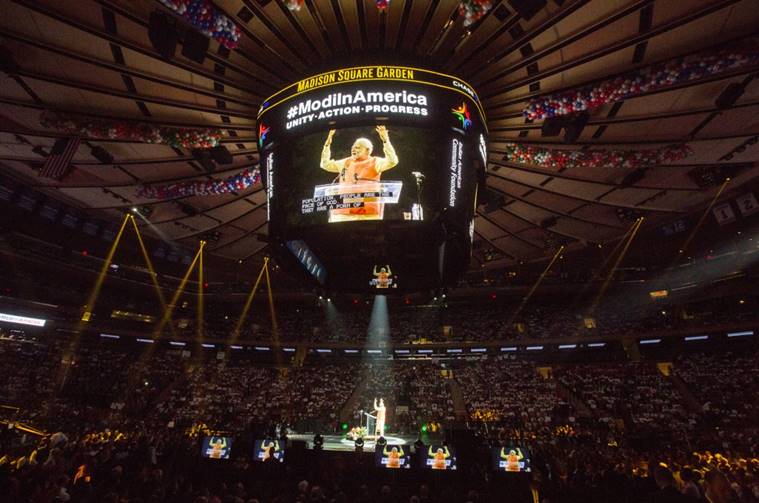 Prime Minister Narendra Modi in Madison Square Garden, New York City. (Reuters/File)
Prime Minister Narendra Modi in Madison Square Garden, New York City. (Reuters/File)
Some six years later, in the run-up to what has been perhaps the most divisive elections in American history, Silicon Valley has been at the forefront of discussions among analysts, not only for how social media companies will prevent election chaos, but also how this influential bubble will vote.
For Indian-Americans in Silicon Valley, it is really party policies, values and how these ultimately impact work, life and the industry at large, that are driving conversations and shaping political affiliations.
Mayank Mehta, co-founder of Cooliris, Capriza and Pulse Q & A, is among the few in the industry openly willing to discuss his political leanings. Mehta is an unapologetic Biden supporter, and says this is in part because of the similarities that the Biden-Harris combination shares with the Obama administration. “They are rational for the most part, and want to encourage innovation and entrepreneurship that have made this country what it is today. Unlike others who were running, (a Biden-Harris) administration won’t likely push for drastic, and in my opinion, unwarranted changes like splitting up the tech giants into smaller companies,” he says.
The Indian-American vote
Although the Indian-American community is scattered across the country, their presence has been most noticeable in Silicon Valley, particularly post the 1990s. In their book ‘The Other One Percent: Indians in America’, authors Nirvikar Singh, Sanjoy Chakravorty and Devesh Kapur write that Indian-Americans own nearly a third of all Silicon Valley start-ups. Approximately 8% of all high-technology firms in the US were founded by Indian-Americans. At present, some 2% of the Fortune 500 companies in the United States, including names like Microsoft, Alphabet, IBM, Adobe, MasterCard, are being helmed by Indian-Americans.

Research shows that for various socio-economic and socio-cultural reasons, Silicon Valley has historically voted Democrat, especially since the 1980s, and these voting patterns have inevitably influenced how the Indian-American community there votes. In 2016, Politico analysed that year’s overall results of the presidential elections in California and found that Hillary Clinton had won the three major counties that constitute Silicon Valley with approximately 73% of the votes.
There is a good reason for these voting patterns, the book explains. While historically these voting patterns can be traced to the 1965 immigration law, and Nixon’s policies towards Pakistan in 1971 during the India-Pakistan war that led to the creation of Bangladesh, more recently, the authors say it is the Republican Party’s immigration policies that have driven Indian-Americans towards the Democrats.
Silicon Valley’s political leanings
Neither a Trump-Pence White House, nor one with Biden-Harris, is going to have any dramatic impact on innovation and tech dominance in Silicon Valley, Mehta believes, largely because of the resilience of the industry and its work-force. “The tech talent has always found a way to work with or work around any changes that come their way,” he says.
“However, four more years of Trump would definitely bring with it a significant morale hit to most of my colleagues and friends in the Valley, as it would be a dampener to those who have worked hard to overcome some of the narrow points of view that the Valley has been notorious for.”
While definite figures are difficult to find for Silicon Valley, conversations that indianexpress.com had indicate that many Indian-Americans have started leaning towards Trump, particularly post 2014. “I have seen a meaningful percentage of the Indian-American population sway towards Trump. However, they tend to be in the older population,” Mehta explains. “Part of the appeal comes from a favourable tax stance, followed by the unfavourable outlook on Pakistan as a close second.”
But this support for Trump or the Republican party may only be limited to certain groups of Indian-Americans and isn’t necessarily representative of any change in collective voting patterns in the community. A recent survey conducted by the University of Pennsylvania, Johns Hopkins-SAIS and the Carnegie Endowment Center for Peace along with data analytics platform YouGov, shows that Indian-Americans remain firmly Democrat.
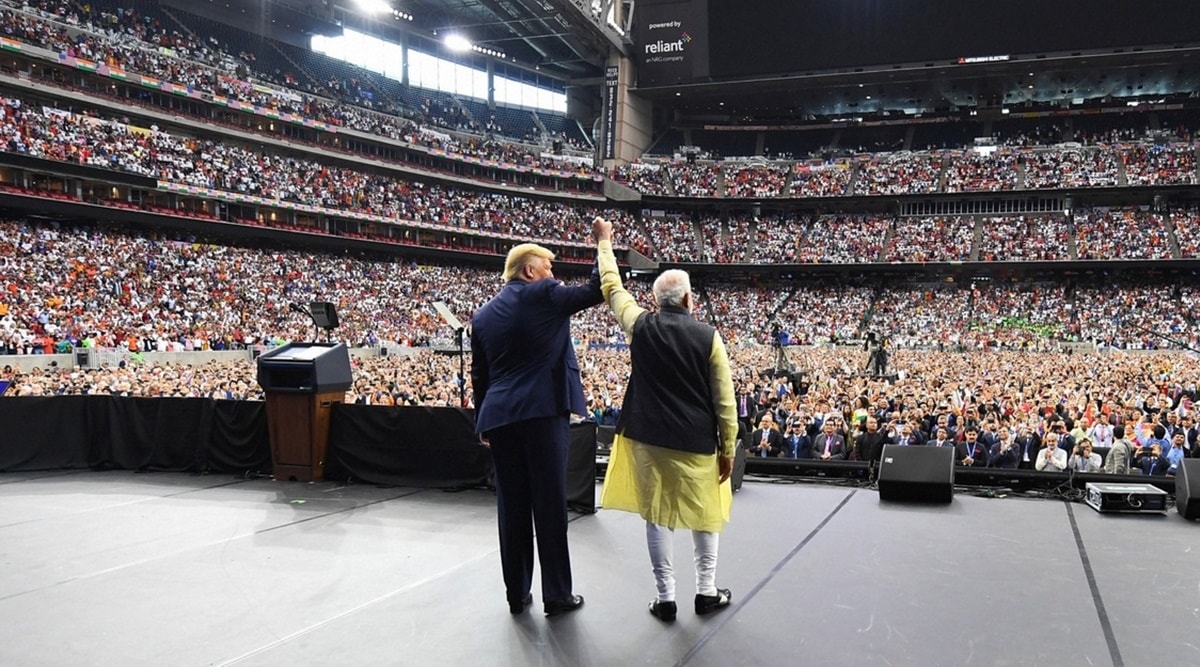 PM Narendra Modi and President Donald Trump at the Howdy, Modi! event in Houston on September 22, 2019 (PTI/File)
PM Narendra Modi and President Donald Trump at the Howdy, Modi! event in Houston on September 22, 2019 (PTI/File)
Some analysts believe that last year’s ‘Howdy, Modi!’ rally was again not about the political influence that India or Modi may exert in the United States, but really an attempt to coax Indian-Americans, particularly those who admire the Indian Prime Minister, to vote red, by underscoring the perception of a Trump-Modi brotherhood or alliance.
While statistics show that the industry largely votes blue, it isn’t that Republican voters are entirely absent here; it is only that few are vocal about their political allegiances. Take Peter Thiel, for instance, Silicon Valley’s conservative poster boy, who was an early Trump supporter and became the first openly gay speaker at a Republican convention in 2016. Thiel’s support for Trump and the Republican party has given many closet Republicans within the Indian community the impetus to be more open about their politics, sources say.
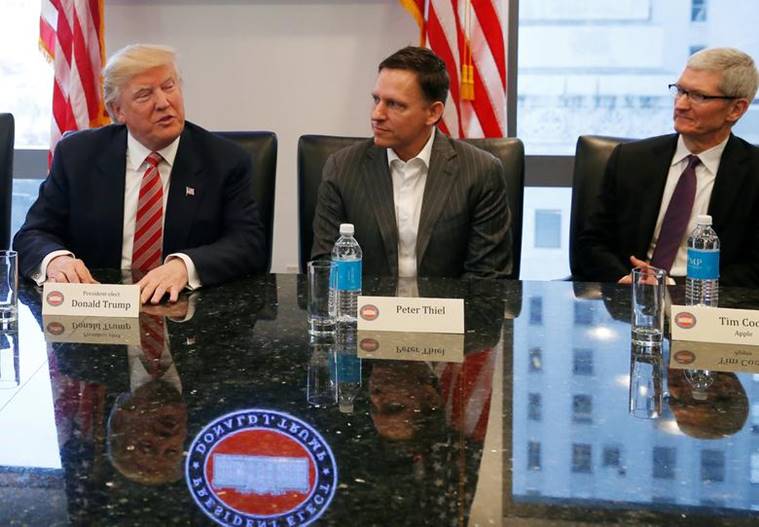 US President-elect Donald Trump speaks while PayPal co-founder and Facebook board member Peter Thiel and Apple Inc CEO Tim Cook look on during a meeting with technology leaders at Trump Tower in New York US, December 14, 2016. (Reuters/File)
US President-elect Donald Trump speaks while PayPal co-founder and Facebook board member Peter Thiel and Apple Inc CEO Tim Cook look on during a meeting with technology leaders at Trump Tower in New York US, December 14, 2016. (Reuters/File)
“It is still quite unpopular to be supportive of Trump on the West Coast and therefore it is quite hard to know if there is real support,” says Dr. Nirav Shah, CEO of Sentinel Healthcare, a digital healthcare company that focuses on remote patient-monitoring, agreeing that conservative voters in Silicon Valley do exist. “It is very difficult to identify individuals who are publicly supportive of the Trump administration. Those who have, faced retribution which has created significant discourse around how closed the culture of technology is given people have not been able to express dissenting opinions.”
Regulating tech
A Brookings Institution analysis suggests a Biden-Harris administration would result in greater regulation of the technology sector. The analysis points to the recent House Antitrust Subcommittee investigation into companies like Amazon, Facebook, Apple and Google, where these big tech firms were accused by lawmakers of engaging in predatory practices and undermining competitors. The role of these companies in context of election interference may be a significant issue that Harris may particularly want to address.
This may not necessarily be a bad thing, says Manish Kothari, co-founder of AlphaSmart and Root-1, both ed-tech companies. “Given the concentration of market power wielded by some technology companies, some sort of regulation is needed & healthy in my opinion. Otherwise, you have the risk of a few, monopolistic players stifling innovation, which has long been the engine of growth for Silicon Valley. Therefore, I believe the Biden-Harris team will effect some needed changes.”
Immigration is another key issue that impacts Indians and Indian-Americans in the United States, not just those within the microcosm of the tech industry. In the four years of the Trump White House, there has been a mix of uncertainty and concern about access to H-1B visas and permanent residency, but researchers believe that a Biden-Harris presidency wouldn’t necessarily benefit Indians.
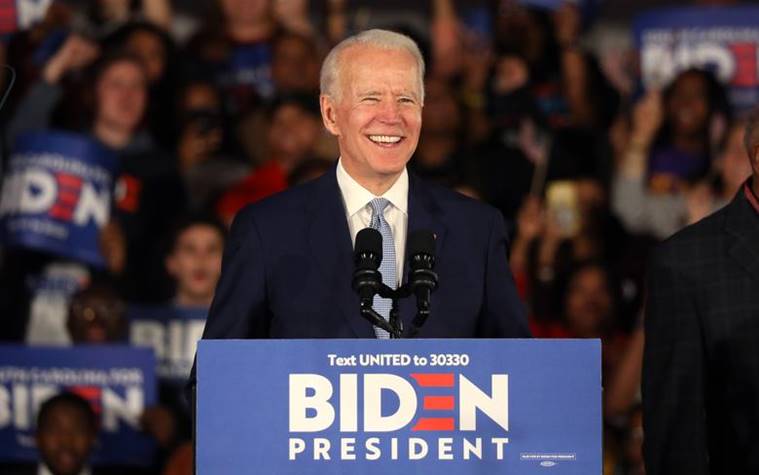 Joe Biden addresses supporters at his South Carolina primary night rally in Columbia, South Carolina, February 29, 2020. (Reuters/File)
Joe Biden addresses supporters at his South Carolina primary night rally in Columbia, South Carolina, February 29, 2020. (Reuters/File)
Although Trump has been more vocal about his stance on immigration, Biden has expressed support for wage-based allocation for H-1Bs. If Biden were to implement this policy, it would directly impact IT contractors, a large percentage of whom come from India and are usually paid much lower salaries.
But while four more years of the Trump administration would result in several complexities for the tech industry, it may not only have only downsides. Kothari points to Trump’s corporate tax cuts implemented in 2017 that benefitted corporations with better earnings. “However, a large share of those incremental earnings went into share buybacks, rather than further investment and the country’s deficit rose even before Covid-19 hit. While four more years may help the stock market in the short term, I believe it will be disastrous in the medium to long term.”
The Trump administration has been good for mid to large-cap technology companies due to favourable corporate policy, Dr. Shah says, which may not necessarily be ideal for gig-economy workers. “Low interest rates are likely to continue which will generally help venture funding for early stage investing unless there is a significant market recession, which is likely.”
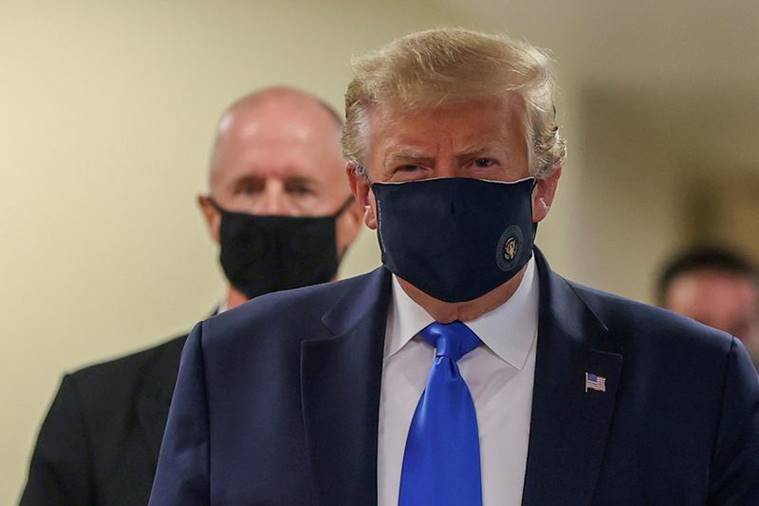 US President Donald Trump wears a mask while visiting the Walter Reed National Military Medical Center in Bethesda, Maryland. (Reuters)
US President Donald Trump wears a mask while visiting the Walter Reed National Military Medical Center in Bethesda, Maryland. (Reuters)
The Trump administration’s handling of the pandemic has not helped his cause much, particularly among employees in the industry. “The Trump administration has poor regard for science, and science and data are what drive the Valley and the tech industry,” says Kothari. “The Valley has long thrived on immigration, something that the Trump administration has fought and will continue to fight if re-elected.”
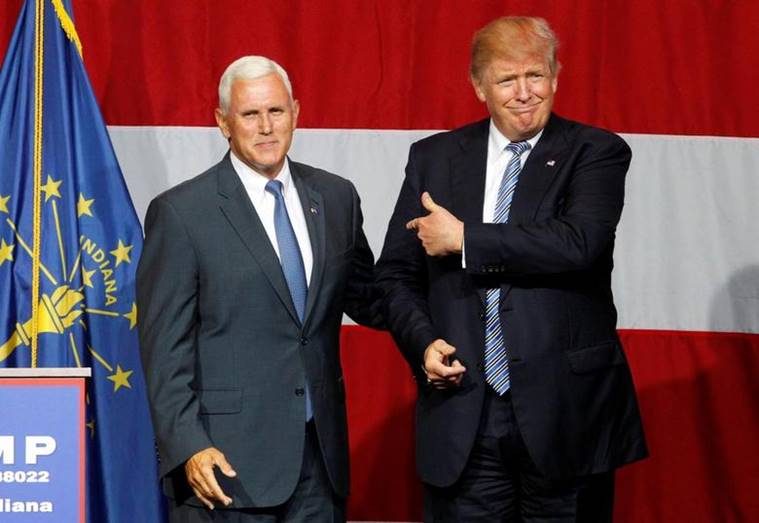 Republican presidential candidate Donald Trump (R) and Indiana Governor Mike Pence (L) wave to the crowd before addressing the crowd during a campaign stop at the Grand Park Events Center in Westfield, Indiana, U.S. on July 12, 2016. (Reuters/File)
Republican presidential candidate Donald Trump (R) and Indiana Governor Mike Pence (L) wave to the crowd before addressing the crowd during a campaign stop at the Grand Park Events Center in Westfield, Indiana, U.S. on July 12, 2016. (Reuters/File)
There are also concerns about what a Biden-Harris combination would mean for Silicon Valley given the candidates’ individual stances on issues like internet platform regulation, technology policy, emerging technologies, China-US relations, foreign government interference, worker rights in the gig economy, and race— all of which have been at the forefront of discussions concerning the US’ tech industry. “The Biden-Harris administration is more likely to increase worker regulations for the gig-economy which has been heavily debated,” says Dr. Shah.
What is at stake
What is different about these elections is tied to all that is at stake this year, explains Mehta, and this is visible in the discourse in context of tech companies as well as their employees. “Be it organisations or individuals, they are more comfortable airing their political views. However in my opinion, it is frowned upon to be pro-Trump in public in the Valley,” he says. “This isn’t because people are not open to debate political viewpoints, it is mostly because some viewpoints held by the Trump-Pence administration attack and violate the very principles of democracy, human rights, and the dignity of the Oval Office.”
Hence, although open support for another four years of Trump in the White House may result in blowback, it might just be a risk that some supporters are unafraid to take.
The most pressing concerns for many Indians and Indian-Americans remain immigration and H-1B visas and how the outcome of the elections impact these issues. “If Biden-Harris prevail, the immigration situation will improve,” says Kothari. “However, the H-1B situation could continue to be challenging because of how the State Department has changed under the Trump administration. It will take some time to undo these changes.”
Trump’s hostile immigration policies over the past four years have deeply impacted many Silicon Valley employees and their families. “Many workers had to return and this could continue in the next administration. Students who come to the US will be protected because new H-1B entrants from India will have more challenges arriving. We’ve already seen both examples of workers having to return to India and students rising to take available jobs,” explains Shah.
“There is more at stake than just four years of an amoral leader. This election is to prove that America is a country that cannot be divided through hate speech, misinformation, and manipulating the masses through social media,” emphasises Mehta. “These elections should serve as a way to start mending this great divide.”
Apr 24: Latest News
- 01
- 02
- 03
- 04
- 05
















